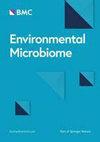华莱士线构造了海草微生物群,是海洋细菌传播的潜在障碍
IF 6.2
2区 环境科学与生态学
Q1 GENETICS & HEREDITY
引用次数: 0
摘要
微生物生物地理学的形成过程并不十分清楚,适用于宏观生物的概念,如扩散障碍,可能不会以同样可预测的方式影响微生物。为了更好地了解已知的宏观生物地理过程如何应用于微观,我们研究了华莱士线两侧与海草相关的微生物群,以确定这一隐蔽的扩散边界对微生物群落结构的影响。我们对印度尼西亚境内位于这条理论界线两侧的 12 个地点的群落进行了研究。我们发现这条界线两侧的微生物群落结构存在明显差异(R2 = 0.09; P = 0.001),并确定了七种微生物属在这条界线两侧的丰富程度不同,其中六种在西部更为丰富,另一种与东部的联系更为紧密。与整体群落相比,被发现数量不同的微生物属的最小细胞尺寸明显较小(GLM:t923 = 59.50,P < 0.001)。尽管假定微生物具有极强的扩散能力,但我们仍能在这一隐秘的生物地理边界两侧发现群落结构的显著差异。来自分界线两侧最近的两个岛屿(巴厘岛和科莫多岛)的样本之间的差异比来自同侧最远岛屿的样本之间的差异更大。我们认为,跨越这一屏障的有限扩散和栖息地的差异是造成所观察到的模式的主要原因。推动该地区大型生物群落分化的隐秘过程也可能在微生物群的大地理模式中发挥作用。本文章由计算机程序翻译,如有差异,请以英文原文为准。
Wallace’s line structures seagrass microbiota and is a potential barrier to the dispersal of marine bacteria
The processes that shape microbial biogeography are not well understood, and concepts that apply to macroorganisms, like dispersal barriers, may not affect microorganisms in the same predictable ways. To better understand how known macro-scale biogeographic processes can be applied at micro-scales, we examined seagrass associated microbiota on either side of Wallace’s line to determine the influence of this cryptic dispersal boundary on the community structure of microorganisms. Communities were examined from twelve locations throughout Indonesia on either side of this theoretical line. We found significant differences in microbial community structure on either side of this boundary (R2 = 0.09; P = 0.001), and identified seven microbial genera as differentially abundant on either side of the line, six of these were more abundant in the West, with the other more strongly associated with the East. Genera found to be differentially abundant had significantly smaller minimum cell dimensions (GLM: t923 = 59.50, P < 0.001) than the overall community. Despite the assumed excellent dispersal ability of microbes, we were able to detect significant differences in community structure on either side of this cryptic biogeographic boundary. Samples from the two closest islands on opposite sides of the line, Bali and Komodo, were more different from each other than either was to its most distant island on the same side. We suggest that limited dispersal across this barrier coupled with habitat differences are primarily responsible for the patterns observed. The cryptic processes that drive macroorganism community divergence across this region may also play a role in the bigeographic patterns of microbiota.
求助全文
通过发布文献求助,成功后即可免费获取论文全文。
去求助
来源期刊

Environmental Microbiome
Immunology and Microbiology-Microbiology
CiteScore
7.40
自引率
2.50%
发文量
55
审稿时长
13 weeks
期刊介绍:
Microorganisms, omnipresent across Earth's diverse environments, play a crucial role in adapting to external changes, influencing Earth's systems and cycles, and contributing significantly to agricultural practices. Through applied microbiology, they offer solutions to various everyday needs. Environmental Microbiome recognizes the universal presence and significance of microorganisms, inviting submissions that explore the diverse facets of environmental and applied microbiological research.
 求助内容:
求助内容: 应助结果提醒方式:
应助结果提醒方式:


